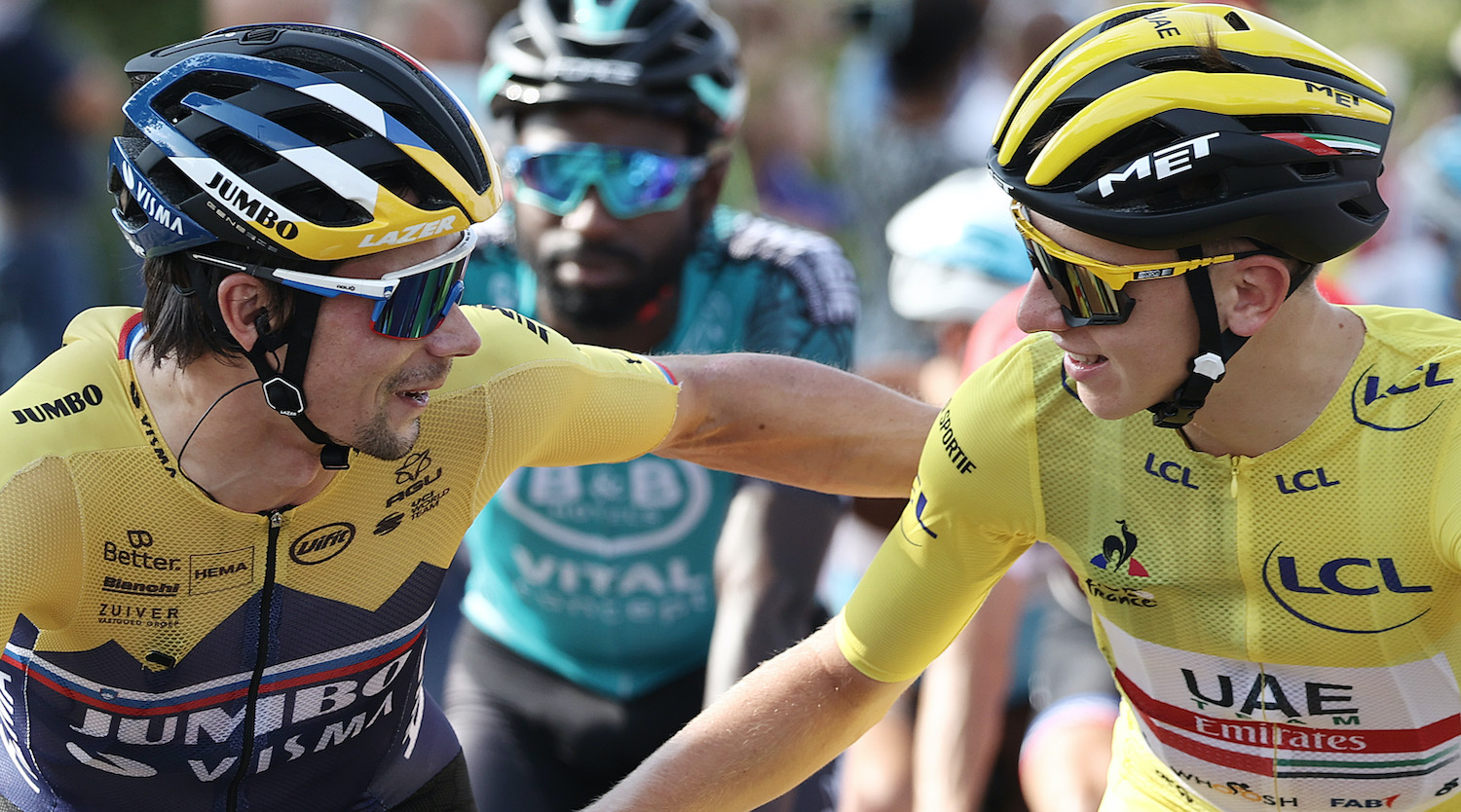Two years after the fact, I am still not sure what to make of Tadej Pogacar's ride up La Planche des Belles Filles. Pogacar, then only 21 years old, won the 2020 Tour de France on the last competitive day of racing with a truly shocking time trial. He trailed fellow Slovenian rider Primoz Roglic by one minute before the stage, then beat him by two minutes to take a comfortable yellow jersey win on a day that seemed as suited a coronation moment for Roglic as could possibly exist. Of the serious contenders, he was easily the most accomplished time-trialist in the field and also one of the best climbers, so a time trial up a mountain seemed like the ideal red carpet for him to win his first Tour de France. Instead, Pogacar became the youngest winner in modern Tour history, the first-ever rider to win the yellow, white, and polka dot jerseys in the same race, and he set the record for the fastest ascent of Belles Filles, earning fair comparisons to Eddy Merckx, Shohei Ohtani, and Steph Curry.
There was precious little in that race to indicate such a dramatic denouement was in the cards, but I still wonder: did Pogacar go supernova, did Roglic explode, or was it a little bit of both? In essence, is Pogacar even beatable? We'll find out soon. Roglic is out for revenge this year. Roglic's own unlikely path to cycling dominance—he started out as a ski jumper then came to the sport very late—seemed to be on the cusp of ultimate validation, and instead he had to sit there and watch the ascendancy of the most dominant young rider the sport has seen in decades, maybe ever. But the thing is, Roglic has been dominant in the two seasons since that brutal defeat, so it's not like the loss broke him. He tooled up for a serious run at Pogacar last year, only for bad luck to knock him out of contention before the real racing even began, which makes this year's Tour less of a trilogy bout and more of the second go-round of a rematch. For the third year running, a Slovenian rider will probably take the yellow jersey, and the most important question ahead of the 2022 Tour de France is: which one?
This year's Tour, which starts tomorrow in Copenhagen, follows a brutal course. All of the sorties over to the relatively unthreatening terrain of central and western France are gone. Instead, the 184 riders who take the start line will have to face several days of rugged riding along the France-Belgium border before leaping through the Alps and then the Pyrenees. There's nowhere to hide. At 3,328 kilometers, this year's route is one of the shortest of the modern era, and though it may seem counterintuitive, the slightly trimmed distance should make the racing more difficult. The climbs speckled throughout this year's route are spiky; long grinders like the Tourmalet and Mount Ventoux are out, in favor of hellions like the Granon and La Super Planche des Belles Filles (as the modifier hints, the finish to this climb is a bit further along a sadistic gravel track.) In essence, this Tour route more closely resembles a typical Vuelta a España than an average Tour de France.
That shift theoretically benefits Roglic, the most dominant Vuelta rider of his generation. He's won three editions in a row, with eight stage wins in the last two years to show for it. Roglic is built with the punchiness required to take down a race as uncompromising as the Vuelta, as most cleanly shown at the 2020 edition of the race, where Richard Carapaz actually finished in less time (eight seconds) than Roglic, though the Slovenian rider beat his Ecuadorian rival by 24 seconds thanks to the 48 bonus seconds he picked up by finishing on the podium of seven stages. But Pogacar is no Chris Froome. He also has a quick sprint in his legs and he rides with a real sense of bravery. Though Roglic is nine years older than Pogacar, the rivalry between the two men is so thrilling because neither guy likes to sit back and race an actuarial Tour de France like those mid-decade Team Sky drones. They prefer to attack, to surprise each other. They like to race their bikes. This year's Tour course incentivizes that sort of boldness.
They will also take absurdly loaded stables of teammates with them. Though Pogacar is the individual favorite, Roglic's Jumbo-Visma team is superior. Betting sites give 25-year-old Dane Jonas Vingegaard the same odds as Roglic, and the team has spoken about them as co-leaders, since Vingegaard earned a strong second place to Pogacar last year. Steven Kruijswijk and Sepp Kuss are both incredible climbers, and while Christophe LaPorte and Nathan Van Hooydonck (he only has the second-coolest name in the Tour) will principally be concerned with shepherding Wout Van Aert on sprint stages, they're plenty strong going uphill as well (Van Aert won on Mount Ventoux.) Pogacar, meanwhile, has seven UAE Emirates teammates who will be riding for him alone. Young American Brandon McNulty looks like a star in the making, and I desperately hope we get a McNulty vs. Kuss battle in the Pyrenees. Rafal Majka, Marc Soler, and George Bennett can all go uphill fast, and Pogacar also has two small forward-sized Nordic rouleurs for the flat stages.
Jumbo-Visma flexed their muscles at this year's Criterium du Dauphine, traditionally considered to be the authoritative Tour de France tune-up race. Roglic won, Vingegaard took second, and the two men crossed the finish line of the queen stage hand-in-hand after destroying the peloton with a brutal attack. They were also set up with a 15-minute turn at the front of the pack by Kruijswijk. It was a stunning team victory, against elite competition, in a race whose results typically portend strong Tour performances. Roglic has won seven of the 11 major stage races he's started since 2018, which is a Merckx-esque record of steady performance.
Pogacar, meanwhile, has also showcased dominant form in 2022. He dominated the Tours of Slovenia and the UAE, and also won Tirreno-Adriatico. Pogacar earned top-fives in a pair of monuments, and most impressively of all, won Strade-Bianche with authority. Nobody in the professional peloton is racing on the level of the two Slovenians, though curiously enough, they have only raced each other head-to-head once this season. Pogacar finished ahead of Roglic at Milan-San Remo, though that race was held in February, so it's not like it told us anything meaningful. Something that made the 2020 Tour defeat so shocking is that Roglic has a very strong record against Pogacar. Each man beat the other to win an edition of Liege-Bastogne-Liege, though Roglic whooped Pogacar at the 2019 Vuelta and the 2021 Tour of the Basque Country, and was giving him the business at the 2020 Dauphine before crashing out. This is not to hint that Roglic should be considered the favorite. Winning a handful of non-Tour races against someone and having a good record in the least competitive Grand Tour weighs significantly less than seizing the 2020 Tour and then dominating the 2021 Tour.
Pogacar's performance last year was crushing. He appeared to float up the mountains, untethered from gravity, racing against his own limits rather than worrying about his would-be rivals. The 23-year-old has shown a more sophisticated grasp of racecraft this season, something he'll need in the shorter iteration of the Tour. He was unchallenged. He is the favorite with good reason. But if anyone has a real shot of knocking him off his perch, it's Roglic. Poor luck and one bad day have kept him from winning a yellow jersey, and though Pogacar is maybe not even yet in his prime, Roglic knows he only has a few more chances to earn a Tour de France win. Maybe an outsider like Aleksandr Vlasov can spoil the party, or perhaps the Ineos triumvirate will produce some magic. The only real certainty of the Tour, especially a Tour with such a hostile route, is that nobody's plan will work out. Someone will crash, someone will have an unexpected great day. Who knows, maybe someone's moronic choice to honor their grandparents will once again help dictate the flow of the Tour. I just hope we get a real Roglic vs. Pogacar showdown.






